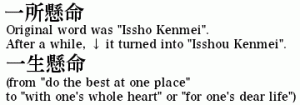Craftsman, artisan, skilled workman are called Shokunin in Japanese.
Shokunin is a worker who has very highly‐developed and skilled techniques.
Originally, high techniques were required, because they presented it to Imperial House or feudal lords, and to sacred place such as Shinto shrine or Buddhism temples.
Therefore Shokunin were respected among any classes.
Present Japan have no class system, but Shokunin are highly respected still now.
Shokunin never compromise, even if 1mm and 1g.
They pay attentions to details (as we may not be able to realize it).
They do it as putting their life on a given work.
They practice very very hard to get high techniques. They are regarded as full-fledged craftsman after over almost ten years practice.
This craftsmanship temperaments not only appear on Shokunin but also on other jobs.
For example, sumo referee is so.
They have a short sword on their waist. With the purpose that they do harakiri with it, if they misjudged.
Of course, actually they do never so, even if misjudge at present. But it’s symbol of working hard seriously.
And also Japanese train system is famous on being punctual.
In Japan, “ten minutes delay” is treated as “accident”. They don’t compromise even if one minute.
These are good example of “to put their life on their job”
What’s the source of this diligence?
Maybe it’s Buddhism, especially the word “Ichigu wo Terasu” of Tendai Buddhism, or “Issho Kenmei” of Zen.
“Ichigu wo Terasu” means “Shine a corner”. I mean, “You should do your best at your ability range”.
![]()
“Issho Kenmei” means “Do your best at one place = Discharge your duties”.

Both words are the same meaning.
Especially, the latter word was accepted among many Samurai class. And it became also the base of Bushi-do.
And also we have a word “Sanpo Yoshi (Good for three directions)”.
It means “take precautions against selfish”. And it means “If you and I are satisfied, society is gonna be good”.
On business, “Think other benefit before thinking own one”.
In common society, “Don’t give somebody trouble”, we understand.
These ideas lead to highly professional ethics such as “Don’t leave a job half done” and “Pay attention to details thoroughly”.
These cultural background is backing up highly professional ethics and high quality Japanese items.
Indeed, I can’t help but say that the items made in Japan are expensive.
However I believe you must be convinced of that, if you knew Japanese craftsmen make it without compromise, and with their stupendous and the great high techniques. If you could see their workshop, probably you would think it’s cheap soon.
Craftsmen of traditional craft make item in order to last 100 years.
So I think craftsmen’s item is cheap, even if the price of tags is expensive (compared with repeatedly buying item which is cheap and easily breaks). And craftsmen’s item will give good after‐sales service.
I wish you avoid “A cheap purchase is money lost”, and enjoy these wonderful techniques & items!

Comments are closed here.